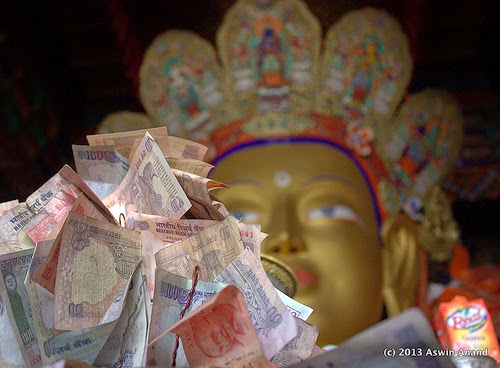CC Liu, Dhr. Seven, Amber Larson (eds.), Wisdom Quarterly; UC Berkeley; Kathleen Maclay; Leland Wong (californiagoldenblogs.com, 3-19-14) via the Tipitaka Network
 |
| The new U.S. greenbacks with their high tech anti-counterfeiting measures (latimes.com) |
 |
| Advances being made at the world's most prominent public university: Cal Berkeley |
Golden Scholars: UC Berkeley researchers control cell migration, revolutionize economics with Buddha
 |
| Offerings, Thiksey Gompa (Aswin/flickr) |
This is the start of a new series focusing on the academic discoveries at UC Berkeley. Getting things started with the non-magic magic of Berkeley is Prof. Brown teaching economics with the Buddha, and others using Oski to help advance tissue engineering and wound healing.
California Golden Blogs (CGB)'s new series highlights the research and academic work being done at UC Berkeley. One of the things to love best about this place is its ability to succeed in the world of athletics and academics, so spending more time sharing the amazing work being done by UC academicians and athletes makes sense.
 |
| Budai (Hotei) and a wad of Asian bills |
Coincidentally, the university just released a video on Twitter to promote this balance of success (see above).
It features prominent Berkeley researchers -- including Jay Keasling, Homayoon Kazerooni, and Robert Reich -- whose work will be discussed later in the series.
Some stories that capture Berkeley's spirit include economics professor Clair Brown, who's looking to change the way the world views spending money and focus instead on reducing suffering and helping others.
To accomplish this, she's helping spread the word and advocate for Buddhist economics. More
Buddhist Economics: oxymoron or idea whose time has come? Kathleen Maclay (Media Relations, 3-13-14)
 |
| “How would Buddha teach Econ. 1?” |
Nevertheless, she’s teaching a sophomore seminar on the topic this semester -- the campus’s second such offering over the past year.
 |
| What's the future of money, Bits or Buddha? |
Brown said she created the one-unit Buddhist Economics course after students in her Introductory Economics (Econ 1) class expressed frustration with the relentless Madison Avenue message that more is better, economic growth paves the path to a better life, and “retail therapy” is a quick trip to nirvana [ultimate bliss].
 |
| It's sustainable, it's all sustainable! |







